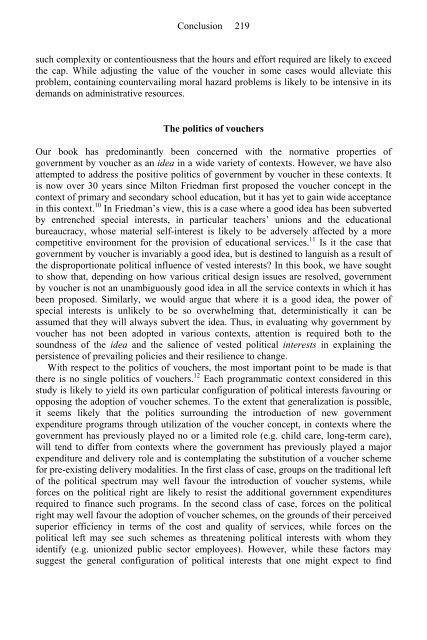Rethinking the Welfare State: The prospects for ... - e-Library
Rethinking the Welfare State: The prospects for ... - e-Library
Rethinking the Welfare State: The prospects for ... - e-Library
You also want an ePaper? Increase the reach of your titles
YUMPU automatically turns print PDFs into web optimized ePapers that Google loves.
Conclusion 219<br />
such complexity or contentiousness that <strong>the</strong> hours and ef<strong>for</strong>t required are likely to exceed<br />
<strong>the</strong> cap. While adjusting <strong>the</strong> value of <strong>the</strong> voucher in some cases would alleviate this<br />
problem, containing countervailing moral hazard problems is likely to be intensive in its<br />
demands on administrative resources.<br />
<strong>The</strong> politics of vouchers<br />
Our book has predominantly been concerned with <strong>the</strong> normative properties of<br />
government by voucher as an idea in a wide variety of contexts. However, we have also<br />
attempted to address <strong>the</strong> positive politics of government by voucher in <strong>the</strong>se contexts. It<br />
is now over 30 years since Milton Friedman first proposed <strong>the</strong> voucher concept in <strong>the</strong><br />
context of primary and secondary school education, but it has yet to gain wide acceptance<br />
in this context. 10 In Friedman’s view, this is a case where a good idea has been subverted<br />
by entrenched special interests, in particular teachers’ unions and <strong>the</strong> educational<br />
bureaucracy, whose material self-interest is likely to be adversely affected by a more<br />
competitive environment <strong>for</strong> <strong>the</strong> provision of educational services. 11 Is it <strong>the</strong> case that<br />
government by voucher is invariably a good idea, but is destined to languish as a result of<br />
<strong>the</strong> disproportionate political influence of vested interests? In this book, we have sought<br />
to show that, depending on how various critical design issues are resolved, government<br />
by voucher is not an unambiguously good idea in all <strong>the</strong> service contexts in which it has<br />
been proposed. Similarly, we would argue that where it is a good idea, <strong>the</strong> power of<br />
special interests is unlikely to be so overwhelming that, deterministically it can be<br />
assumed that <strong>the</strong>y will always subvert <strong>the</strong> idea. Thus, in evaluating why government by<br />
voucher has not been adopted in various contexts, attention is required both to <strong>the</strong><br />
soundness of <strong>the</strong> idea and <strong>the</strong> salience of vested political interests in explaining <strong>the</strong><br />
persistence of prevailing policies and <strong>the</strong>ir resilience to change.<br />
With respect to <strong>the</strong> politics of vouchers, <strong>the</strong> most important point to be made is that<br />
<strong>the</strong>re is no single politics of vouchers. 12 Each programmatic context considered in this<br />
study is likely to yield its own particular configuration of political interests favouring or<br />
opposing <strong>the</strong> adoption of voucher schemes. To <strong>the</strong> extent that generalization is possible,<br />
it seems likely that <strong>the</strong> politics surrounding <strong>the</strong> introduction of new government<br />
expenditure programs through utilization of <strong>the</strong> voucher concept, in contexts where <strong>the</strong><br />
government has previously played no or a limited role (e.g. child care, long-term care),<br />
will tend to differ from contexts where <strong>the</strong> government has previously played a major<br />
expenditure and delivery role and is contemplating <strong>the</strong> substitution of a voucher scheme<br />
<strong>for</strong> pre-existing delivery modalities. In <strong>the</strong> first class of case, groups on <strong>the</strong> traditional left<br />
of <strong>the</strong> political spectrum may well favour <strong>the</strong> introduction of voucher systems, while<br />
<strong>for</strong>ces on <strong>the</strong> political right are likely to resist <strong>the</strong> additional government expenditures<br />
required to finance such programs. In <strong>the</strong> second class of case, <strong>for</strong>ces on <strong>the</strong> political<br />
right may well favour <strong>the</strong> adoption of voucher schemes, on <strong>the</strong> grounds of <strong>the</strong>ir perceived<br />
superior efficiency in terms of <strong>the</strong> cost and quality of services, while <strong>for</strong>ces on <strong>the</strong><br />
political left may see such schemes as threatening political interests with whom <strong>the</strong>y<br />
identify (e.g. unionized public sector employees). However, while <strong>the</strong>se factors may<br />
suggest <strong>the</strong> general configuration of political interests that one might expect to find


